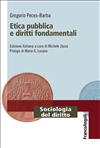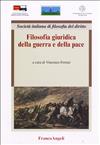
LIBRI DI MARIO G. LOSANO
La ricerca ha estratto dal catalogo 38 titoli




I sei saggi qui presentati, scritti fra il 1986 e il 2000, evidenziano l’evoluzione del pensiero di Gregorio Peces-Barba sui diritti fondamentali. Arricchiscono il testo un prologo di Mario G. Losano che illustra come Peces-Barba abbia fondato l’università Carlos III di Madrid, facendone un punto di riferimento internazionale per lo studio dei diritti fondamentali, e una prefazione di Michele Zezza che documenta la struttura e i punti problematici della concezione dei diritti fondamentali elaborata da Peces-Barba.
cod. 1525.49


Mentre la prima relazione si concentra sugli strumenti concettuali della ricerca, la seconda affronta gli aspetti pratici dell’inserimento sociale dei giovani immigranti. Anzitutto alcuni dati aiutano a confrontare la situazione generale degli immigrati in Italia e in Spagna con i problemi pecificamente siciliani. Tra le difficoltà pratiche, le prime da identificare e risolvere all’arrivo degli immigrati in Sicilia sono la valutazione dei loro titoli scolastici ovvero delle loro conoscenze, e il loro eventuale inserimento nel sistema scolastico italiano. Al fine di promuovere una conoscenza più precisa dei giovani immigrati in Sicilia, la "Fondazione Le Vele" di Pavia ha svolto una ricerca empirica, brevemente descritta in questa relazione. Nella prossima, i sociologi dell’Università di Pavia offrono una descrizione più particolareggiata della loro ricerca empir ica.

Mentre la prima relazione si concentra sugli strumenti concettuali della ricerca, la seconda affronta gli aspetti pratici dell’inserimento sociale dei giovani immigranti. Anzitutto alcuni dati aiutano a confrontare la situazione generale degli immigrati in Italia e in Spagna con i problemi specificamente siciliani. Tra le difficoltà pratiche, le prime da identificare e risolvere all’arrivo degli immigrati in Sicilia sono la valutazione dei loro titoli scolastici ovvero delle loro conoscenze, e il loro eventuale inserimento nel sistema scolastico italiano. Al fine di promuovere una conoscenza più precisa dei giovani immigrati in Sicilia, la "Fondazione Le Vele" di Pavia ha svolto una ricerca empirica, brevemente descritta in questa relazione. Nella prossima, i sociologi dell’Università di Pavia offrono una descrizione più particolareggiata della loro ricerca empir ica.

La ricerca documentata in questo dossier ha per oggetto l’inserimento sociale dei giovani immigrati in Sicilia, legali o illegali. Nella ricerca (denominata "Progetto Dedalo") hanno cooperato un ente religioso di Monreale (Casa del Sorriso), una fondazione no-profit di Pavia ("Le Vele") e un gruppo di ricercatori dell’Università di Pavia. Il progetto era diretto da Mario G. Losano, Un iversità del Piemonte Orientale, Alessandria, e Universidad Carlos III, Madrid. I testi qui pubblicati vennero presentati in due congressi tenutisi in Sicilia, a Monreale, nel 2009 e nel 2010.

The rehabilitation of the German « war traitors »: a still unresolved issue - Among its present problems of transitional justice, Germany faces a specific unresolved issue: the rehabilitation of the so called « war traitors » (Kriegsverräter). After the paradigm change in the German historiography concerning the supposed relative independence of Wehrmacht vis-à-vis of the Nazi Party, two discussed exhibitions on Wehrmacht's crimes during WWII have strengthened the request of rehabilitating the last « war traitors ». The article explains the juridical background of the judgements issued by German war courts, and the wearing story of the sluggish rehabilitation of deserters, defeatists and civil « war traitors » (concluded in 2002 only). Politicians and jurists are now divided about the still pending issue of rehabilitating the military « war traitors », or, more precisely, the last survivors among them.

Spanish geopolitics in Jaime Vicens Vives: Between the Republic and Franchism - The article describes the Spanish geopolitics in the XX century. In this context, geopolitics was a relevant although not central interest for one of the most important Catalan intellectuals, Jaime Vicens Vives (1910-1960). He discovered geopolitics through the works of Karl Haushofer. Then, on behalf of the Spanish Republic (an almost forgotten event), he started writing in Catalan a geopolitics of Catalonia from a left-wing point of view. Just before printing this book, the victory of Franco's Nationalists compelled him to transform it into a right-wing geopolitics of Spain, finally published in Spanish in 1940. After the end of the war he reconsidered the whole matter in a new book of 1950, where he stressed the possibility of a new imperial mission of Spain in the new world order. In the course of time his historiographic position became closer to those of Toynbee and Braudel, an evolution suddenly terminated by his death in 1960.

Ambiguous Tropics: Gilberto Freyre’s Happy Multi-ethnicity and the Last Portuguese ColonialismABSTRACT: 1. The forming and fame of a intellectual going against the traffic. 2. The trilogy on Brazil’s patriarchal society. 3. For racial fusion against German geopolitics: Gilberto «the communist »? 4. The invitation by Salazar’s Portugal: Gilberto «the fascist»? 5. Gilberto Freyre’s vision of Portuguese colonialism in 1937- 1940. 6. The works written during his trip in the Portuguese colonies in 1951-52. 7. The strenghtening of Gilberto Freyre’s Lusitanian-tropicalism (1958-1961): 8. Lusitanian-tropicalism, today.

Durkheim’s Reception in Turkey: The Social Question and French Solidarism (by Mario G. Losano) - ABSTRACT: As there is much talk these days again about third waysbetween communism and liberalism, it may be helpful to look back at the comparable discussion that took place at the end of the nineteenth and the beginning of the twentieth centuries. French solidarism took the form of a movement of ideas that was also capable of influencing political action. The organisation of social solidarity in Pierre Leroux and Célestin Bouglé is all but forgotten nowadays, while Durkheim’s non-solidaristic thinking is alive and well. Two little-known aspects are dealt with at length: the solidaristic proposals launched by Léon Bourgeois, the French socialist and 1920 Nobel Peace Prize laureate, and the shift of attention from the worker to the consumer, with the consequent emphasis on the co-operative movement. Legal socialism is another product of these ferments. One all but ignored aspect of the spread of French solidarism is documented by the reception accorded to Durkheim’s solidaristic theories in republican Turkey, brought about by Ziya Gökalp (1876-1924), Turkish nationalism’s leading ideologue. Lastly, French solidarism was also taken up by Christian Social thinking in Germany, although the Social Democratic reform movement was to prove more weighty there. Many of today’s political theories (such as communitarianism) are similar to solidaristic theories, although they make no explicit reference to them as roots.

Gli interessi economici nella scelta tra guerra e pace, l’estremismo religioso ed etnico, gli argomenti prodotti dai poteri forti e dai media per giustificare o squalificare le azioni militari, il classico tema della “guerra giusta”: questi i temi affrontati nel volume, che raccoglie gli atti dell’ultimo congresso della Società italiana di filosofia del diritto.
cod. 2000.1214

Romania and the Balkan Minorities in the European Union ABSTRACT: When Romania and Bulgaria joined the European Union on 1 January 2007, the event obliged a comprehensive reappraisal to be made of certain problems that had only been tackled piecemeal in previous years. This article is divided into two parts and is restricted to examining the main problems related to Romania, extending some analyses to apply to the minorities in the entire Balkan area. In numerous cases, the author was able to access original Romanian documents. The first part of the article defines certain general concepts to be used later on: what is meant by intra-community immigration and by minority. It then provides data about the history of Romania, the formation of its minorities and two problem-prone results of the state’s recent territorial evolution, i.e. the formation of the Republic of Moldova and of the unrecognised state of Transdniestria. The fact is that their proximity to the trouble spots in the Caucasus and, therefore, to Islam, and the permeability of their borders constitute an open sore for the European Union. The second part examines the connection between minorities and migratory trends in present-day Romania: in particular, the Hungarian minority (the source of decades of friction with Hungary) and the Rom minority (also a source of problems inside Romania and pushed to emigrate by the increasing degree of domestic insecurity). Romania is trying to shield the Rom against this insecurity by using police measures (examined here in detail) and a schooling policy that also takes the linguistic requirements of its numerous minorities into account. The last two paragraphs are then dedicated to Romanian migration towards the other member states of the European Union and, in particular, to the legal problems that have arisen in Italy in the transition phase: there are many Romanians who made their way into Italy as illegal immigrants and, as such, are now subject to criminal proceedings; yet in the meantime they have become European Union citizens, so some judges are questioning whether they can still be prosecuted for the crime of illegal immigration.


South American geopolitcs follows a different path with respect to its American or European versions. The latter explore in particular its contribution to the theory of «living space» (lebensraum) and the expansionist wars fought by Nazi Germany. For this reason, after the Second world war, western democracies set geopolitics aside. In South America geopolitics had arrived in the Thirties and the article examines nazi propaganda which, drawing on geopolitical arguments, aimed to create a «Deutsch Südamerika», starting from German colonies in Argentina and southern Brazil. The most relevant Brazilian figures who kept on cultivating geopolitics during the Cold war and military dictatorship are analyzed. Geopolitics was used, for example, in the fight for the supremacy over South America which involved Argentina and Brazil, in the debate over the internationalization of the Amazon, in the plans for the control of Antarctica. Geopolitics has now partly gone back to being a scientific discipline in the West, anyhow it has to be kept under observation as it tends to be used by politicians and generals to advance territorial claims which may lead to international crises, and even open armed conflicts.

The essay reports the remarks of many Latin American and Spanish authors who refer to the essay (published on «Teoria Politica», 2003, n. 1, pp. 3-22) devoted to analyzing the terms «peronism», «justicialismo», «regime», «populism» etc. Extended quotations translated into Italian and divided by topic underline the anomalies in the Italian usage of these terms and offer examples related to the Spanish usage. The essay opens with an analysis of the evolution and involution of political language under European dictatorships. Particularly relevant are the different and often conflicting opinions on the tightness of the relationship between peronism and fascism, and the final remarks on Perón Uruguayan origins.

Peronism and Justicialismo: Different Meanings in Italy and South America (by Mario G. Losano) The terms populism, peronism and justicialismo are often used to mean phenomena belonging to the same conceptual area. At the same time, though, each one of them has got many meanings, which vary in connection with the historical and geographical context in which they are used. The author analyses the different meanings of the three terms, both in their technical usage and in common speaking, going back to their historical background and enphasizing the rather deep differences of usage in Italy and South America. A case in point is that of justicialismo which, in Latin America, is the political doctrine of peronism, based on a mixture of social reform and populistic techniques of power management, while, in Italy it ended up pointing to the theory and practice of using trials for political ends by judges.

